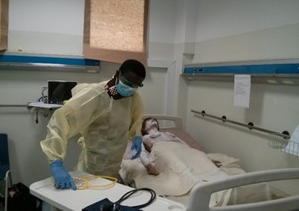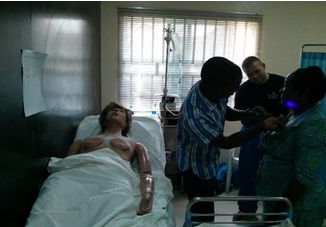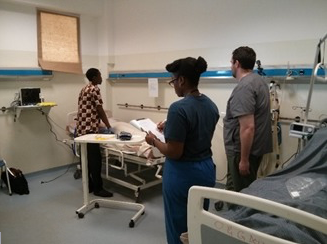Shaping the future: Our strategy for research and innovation in humanitarian response.

Shaping the future: Our strategy for research and innovation in humanitarian response.


Recap from last blog
In March/ April 2015, a member of the Johns Hopkins team, Dr. Adaora Chima paid preliminary visits to the participating hospitals in Nigeria and Ghana with the following core objectives.
“Failure is instructive. The person who really thinks learns quite as much from his failures as from his successes” – John Dewey
In May/ June 2015, the team returned to the partnering hospitals in West Africa to commence training of nurses and physicians using clinical scenarios that had been designed to be relevant to both cadres. The expertise of members of the training team included infection control practice and epidemiology, simulation based training, human factors psychology and comprised of 3 personnel at each site. For logistical reasons, a previously selected site (National Hospital, Abuja, Nigeria) was replaced by University of Nigeria Teaching Hospital, Enugu, Nigeria, for this phase of the program.


Prior to each training session, the participant’s baseline performance was assessed using a survey (for theoretical knowledge of infection control practice) and a clinical simulation scenario depicting an infectious disease endemic to the region, in this case cholera. All personal protective equipment and materials were provided and participants were asked to perform clinical duties on a simulated patient (a mannequin contaminated with simulation germ powder) using any PPE(s) they thought they needed, at any time during their clinical scenarios.
Facilitators were available to assist participants but did not prompt or intervene in decision making. Participants’ choice and technique of PPE adornment was documented using a checklist. On completion of their clinical tasks and exit from the patient area, participants were assessed for personal and environmental germ powder contamination, using a black light that picks up fluorescent powder.
Each participant was trained one on one by a Johns Hopkins Infection control practitioner using a technique called Rapid Cycle Deliberate Practice (RCDP). RCDP utilizes a try and try again approach where participants learn from their mistakes and repeat the tasks until they have achieved proficiency. By using medical simulation, the team presented a risk free environment for participants to err without ‘consequences’ as well as multiple opportunities to practice what they had learned.
On completion of the training session, participants were presented with a different clinical scenario (bacterial meningitis) to manage.
Location Dates Number of participants Trainers identified
Site 1 University of Abuja Teaching Hospital, Gwagwalada, Nigeria May 11-15 30, 5
Site 2 Tamale Teaching Hospital, Tamale, Ghana May 25-29 27, 7
Site 3 University of Nigeria Teaching Hospital, Nigeria June 8-12 36, 9
In total, across the 3 hospitals, 93 health workers were trained and 20 local trainers were identified. The local trainers will be conducting training sessions at secondary training sites.
In an earlier blog entry, we emphasized the need for numerous rehearsals to iron out any potential issues in the designed scenarios. As often happens when translating science from the bench or an ideal environment like a lab to the real world, the training team had to make modifications at each training site.
We’ve created a small photo gallery to provide a more visual synopsis of our experience.
Please look for our monthly updates on this blog to read more about our use of simulation to train health workers on preventative infection control measures. Please feel free to contact us with inquiries you may have by sending an email to Adaora M Chima, MBBS, MPH ([email protected]) or Benjamin H Lee, MD, MPH ([email protected])

 Please upgrade your browser
Please upgrade your browser
You are seeing this because you are using a browser that is not supported. The Elrha website is built using modern technology and standards. We recommend upgrading your browser with one of the following to properly view our website:
Windows MacPlease note that this is not an exhaustive list of browsers. We also do not intend to recommend a particular manufacturer's browser over another's; only to suggest upgrading to a browser version that is compliant with current standards to give you the best and most secure browsing experience.